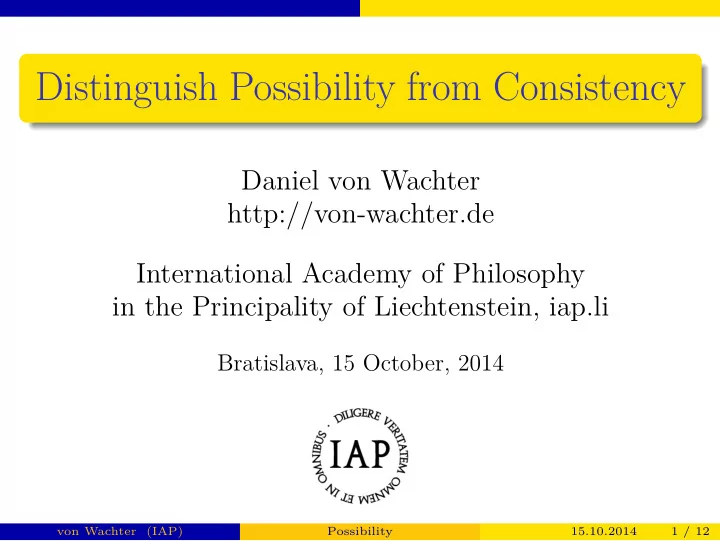

Distinguish Possibility from Consistency Daniel von Wachter http://von-wachter.de International Academy of Philosophy in the Principality of Liechtenstein, iap.li Bratislava, 15 October, 2014 von Wachter (IAP) Possibility 15.10.2014 1 / 12
Questioning assumptions Hermann Lotze 1874 about ‘synthetic judgements a priori’: ‘We defend here a crucial element of German philosophy, for which we are attacked by all nations.’ Phenomenology: There are true modal statements about the world. Logical empiricism: understand all modality in terms of contradictions. Today instead: Understand modality in terms of possible worlds. von Wachter (IAP) Possibility 15.10.2014 2 / 12
Questionable assumptions 1 Question the empiricist rejection of primitive modality. 2 Question the assumption that analytic sentences are paradigm cases of necessity statements. 3 Question: ‘Within truth there are the modes of truth, ways of being true: necessary truth and contingent truth.’ (Ted Sider) 4 Question the method of ontological commitments. I do not analyse the modal concepts, they are primitive. I want to describe. von Wachter (IAP) Possibility 15.10.2014 3 / 12
Pradigms of modal statements Not analytic statements. Not ‘p is contradictory/coherent’. ‘There cannot be a tone without a pitch’ ‘One cannot be guilty for something one did not do freely’ ‘It is possible that there exists something that is 3 kgs and has a charge of 5 C.’ ‘It is impossible that there is something that has charge but no mass.’ ‘It is impossible that there is something that is jealous and has spin 1/2.’ von Wachter (IAP) Possibility 15.10.2014 4 / 12
How do modal questions arise? Humans have the ability to construe descriptions of things by combining predicates. The properties referred to may or may not be combinable. For every consistent combination or predicates the question arises whether the existence of a thing to which they all apply is possible. We know that some properties are combinable, but not that all are. For inconsistent descriptions, no modal questions arise. von Wachter (IAP) Possibility 15.10.2014 5 / 12
The difference between consistency and possibility Two predicates are contradictory if the one is used in order to say of something, amongst other things, that the other one does not apply. If A and B are consistent predicates whose objects are incompatible, that may but need not be a priori obvious. Contradictoriness is something very different from impossibility. Being contradictory is something conceptual, modality is not. Consistency is a precondition for the truth of a modal statement as for any other statement. von Wachter (IAP) Possibility 15.10.2014 6 / 12
The form of modal statements 1 It is possible that there is something that is A and B. 2 It is possible that there is nothing that is A and B. 3 It is necessary that there is something that is A and B. 4 It is impossible that there is something that is A and B. (Then it is true that ‘if something is A, then it is not B’) von Wachter (IAP) Possibility 15.10.2014 7 / 12
Conclusion For any consistent set of predicates, the question arises whether the existence of something to which they all apply is possible. For an inconsistent set of predicates, this question does not arise. Because consistency and possibility are very different phenomena, we should say: Consistency is not a kind of possibility; contradictoriness is not a kind of impossibility. Stop using ‘logical possibility’. Modal concepts are primitive (not composed). The empiricist worries are misguided. von Wachter (IAP) Possibility 15.10.2014 8 / 12
Only one kind of modality ‘Logical necessity’ is analyticity and no kind of necessity, ‘logical possibility’ is consistency and no kind of possibility. Laws of nature might be necessary, but that would not be an extra kind of necessity. There are degrees of how possible something is, depending on hard or likely it is to be realised. Chalmer’s objection: if modality were not reducible to contradictoriness, that would be modal dualism . My reply: monism, ‘logical possibility’ is not possibility. von Wachter (IAP) Possibility 15.10.2014 9 / 12
Two kinds of entailment P logically entails Q if ‘P and not Q’ is contradictory. P synthetically entails Q if it is impossible that P and not Q. von Wachter (IAP) Possibility 15.10.2014 10 / 12
Necessary predications Is there a real question whether it is necessary that the rose is red? von Wachter (IAP) Possibility 15.10.2014 11 / 12
Composed concepts Concept A is a part of concept B: ‘B’ is used in order to say about something, amongst other things, that it is A. Few concepts are composed, and they are easy to analyse. Analysing composed concepts is not the main philosophical task. Instead: Describe what falls under them. von Wachter (IAP) Possibility 15.10.2014 12 / 12
‘Water is H2O’ Question whether there is a modal question here. Many think that this is the only synthetic modality. I have defended a different kind of synthetic modality. von Wachter (IAP) Possibility 15.10.2014 13 / 12
Recommend
More recommend